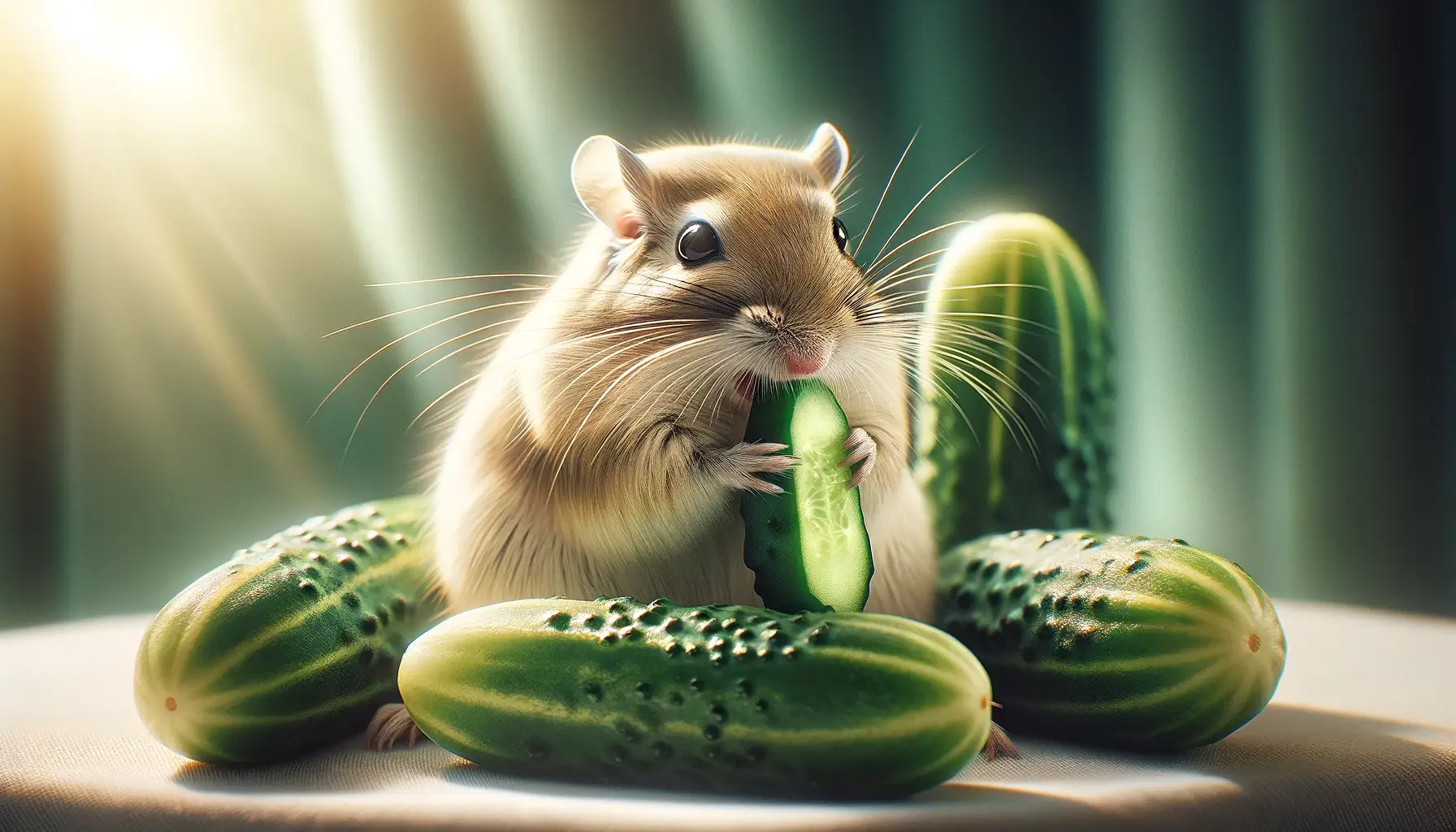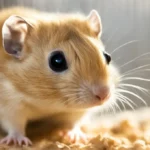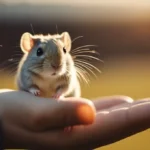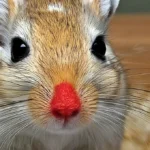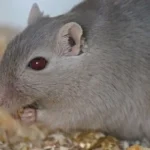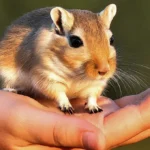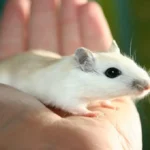Gerbils are fascinating and lively pets that bring joy to households around the world. These small rodents are known for their curious nature and playful behavior, making them delightful companions. As with any pet, ensuring a balanced and nutritious diet is crucial for their health and well-being.
This brings us to a common question among gerbil owners: Can gerbils eat cucumber? In this article, we delve into the nutritional profile of cucumbers, their benefits, and concerns when it comes to feeding them to your furry friends.
Nutritional Profile of Cucumbers
Cucumbers are a popular vegetable (technically a fruit) known for their crisp texture and high water content. They are composed of about 96% water, making them an excellent source of hydration.
Besides water, cucumbers contain several key nutrients beneficial for gerbils, including magnesium, potassium, manganese, and vitamins C and K. These nutrients play vital roles in maintaining a healthy metabolism, bone strength, and overall vitality.
However, it’s important to note that while cucumbers are nutritious, their high water content and relatively low calorie and nutrient density mean they should not be the mainstay of a gerbil’s diet.
Instead, they should be considered as a supplement to a balanced diet tailored to meet the nutritional needs of gerbils.
| Nutrient | Amount |
|---|---|
| Water | 95.23 g |
| Energy | 15 kcal |
| Protein | 0.65 g |
| Total lipid (fat) | 0.11 g |
| Carbohydrate, by difference | 3.63 g |
| Fiber, total dietary | 0.5 g |
| Sugars, total including NLEA | 1.67 g |
| Calcium, Ca | 16 mg |
| Iron, Fe | 0.28 mg |
| Magnesium, Mg | 13 mg |
| Potassium, K | 147 mg |
| Vitamin C, total ascorbic acid | 2.8 mg |
| Vitamin K (phylloquinone) | 16.4 µg |
Gerbils and Cucumbers: The Good
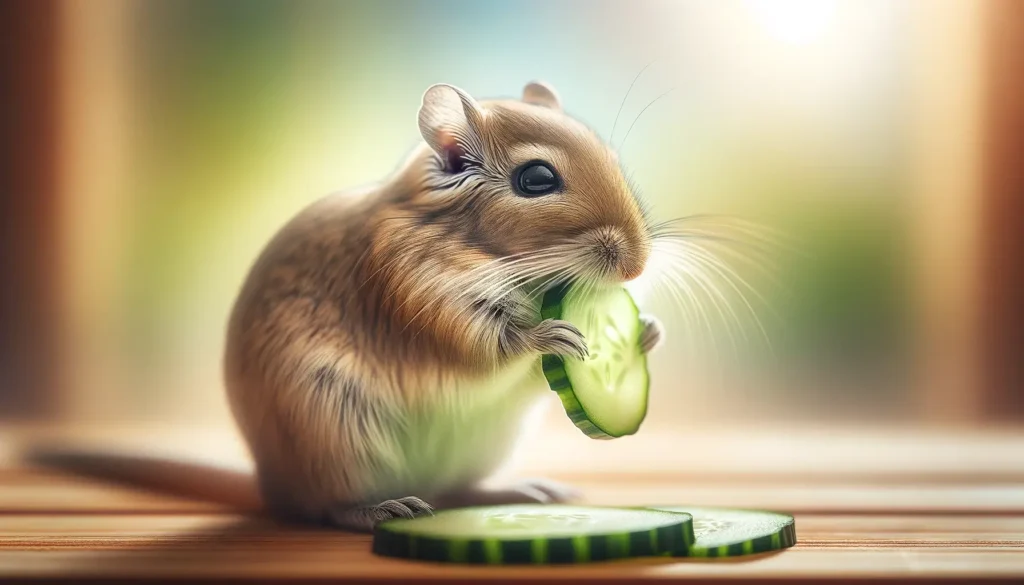
Feeding cucumbers to gerbils can offer several benefits, making them a suitable snack in moderation. Here are some of the positive aspects of including cucumbers in your gerbil’s diet:
- Hydration: Given their desert origins, gerbils are efficient in conserving water. However, a little extra hydration, especially during warmer months, can be beneficial. The high water content in cucumbers can help keep your gerbil hydrated and prevent urinary tract issues.
- Low Calorie and Low Fat: Cucumbers are low in calories and virtually fat-free, making them an ideal snack for maintaining a healthy weight in gerbils. Obesity can be a concern in small pets, and offering low-calorie snacks like cucumbers can help manage their weight effectively.
- The Crunch Factor: Gerbils have a natural inclination to gnaw, which helps keep their continuously growing teeth in check. The crunchy texture of cucumbers provides a satisfying chew for gerbils, aiding in dental health. Additionally, the act of gnawing on crunchy vegetables can be a source of mental stimulation and physical activity for these active creatures.
Incorporating cucumbers into your gerbil’s diet can offer hydration benefits and serve as a healthy, low-calorie snack. However, it’s crucial to balance this with other nutritional needs and monitor the portion sizes to avoid any health issues.
Gerbils and Cucumbers: Points of Caution
While cucumbers can be a refreshing and nutritious snack for gerbils, there are several considerations to keep in mind to ensure the health and happiness of your furry friend. Let’s explore some of the potential concerns associated with feeding cucumbers to gerbils.
The Risk of Diarrhea
The high water content in cucumbers, while beneficial for hydration, poses a risk of causing diarrhea in gerbils if consumed in large quantities. Gerbils are desert animals, and their digestive systems are not designed to handle excessive amounts of water.
Diarrhea can lead to dehydration and nutrient loss, which can be particularly dangerous for small pets. To prevent this, it’s crucial to offer cucumbers in moderation and observe your gerbil’s reaction to this new addition to their diet.
Nutritional Deficiencies
Cucumbers, though packed with certain vitamins and minerals, lack the comprehensive nutritional profile required to meet all of a gerbil’s dietary needs. Relying too heavily on cucumbers as a food source can lead to nutritional deficiencies, particularly in protein and essential fats that cucumbers lack.
It’s important to ensure that cucumbers are only a small part of a well-rounded diet that includes a variety of seeds, grains, and other vegetables.
The Importance of Moderation
Moderation is key when introducing cucumbers into your gerbil’s diet. Due to their high water content and relatively low nutritional density, cucumbers should be considered a treat rather than a staple food.
Offering small, bite-sized pieces of cucumber once or twice a week is a safe way to include this vegetable in your gerbil’s diet without risking overhydration or nutritional imbalance.
How to Properly Feed Cucumbers to Gerbils?
Feeding cucumbers to your gerbil can be a healthy and enjoyable experience for your pet if done correctly. Here are some tips on how to properly introduce cucumbers into their diet:
- Preparation: Wash the cucumber thoroughly to remove any pesticides or contaminants. Peel the skin if it’s not organic, as the skin can contain harmful chemicals. Cut the cucumber into small, manageable pieces that your gerbil can easily hold and chew.
- Serving Size and Frequency: Offer a small piece of cucumber (about the size of a gerbil’s head) once or twice a week. This frequency ensures that your gerbil receives the hydration and nutritional benefits of cucumbers without the risks associated with overconsumption.
- Dietary Balance: Always ensure that cucumbers are part of a balanced diet. A high-quality gerbil food mix should form the basis of their diet, supplemented with a variety of fruits, vegetables, and occasional treats like cucumbers.
Other Healthy Snacks for Gerbils
In addition to cucumbers, there are many other fruits and vegetables that can make healthy snacks for gerbils. Here are some gerbil-friendly options:
- Apples (without seeds)
- Bananas
- Broccoli
- Carrots
- Cauliflower
- Lettuce (in small amounts)
- Strawberries
When introducing new foods, do so gradually to avoid upsetting your gerbil’s stomach. Always research and ensure the safety of any new snack, as some foods can be harmful to gerbils.
FAQs About Gerbils and Cucumbers
Can gerbils eat cucumber skin?
Yes, gerbils can eat cucumber skin, but it’s important to wash the cucumber thoroughly to remove any pesticides or chemicals. If the cucumber is not organic, peeling the skin is advisable to avoid potential toxins.
How often can gerbils eat cucumbers?
Cucumbers should be fed in moderation, ideally as a small treat once or twice a week. This frequency allows your gerbil to enjoy the hydration and nutritional benefits of cucumbers without the risk of overconsumption.
Can gerbils eat cucumber raw or cooked?
Gerbils can safely eat cucumber both raw and cooked, although raw is more beneficial and mimics their natural diet. Cooking cucumber can reduce its nutritional value and alter its texture. Always ensure that any cooked cucumber is plain, without added oils, spices, or seasonings, to avoid potential health issues.
Can gerbils eat cucumber seeds?
Yes, gerbils can eat cucumber seeds without any problems. The seeds are small and soft enough not to pose a choking hazard, and they do not contain harmful substances. However, as with the cucumber flesh, seeds should be given in moderation as part of a balanced diet to avoid digestive issues.
Are there any vegetables that gerbils should never eat?
Yes, certain vegetables are harmful to gerbils and should be avoided. These include onions, garlic, and rhubarb, as they can be toxic to small pets. Always research before introducing a new vegetable to your gerbil’s diet.
Can cucumbers replace water for gerbils?
While cucumbers are high in water content and can help with hydration, they should not replace fresh, clean drinking water. Gerbils should always have access to water through a drinking bottle with a metal sipper tube.
Conclusion
In conclusion, cucumbers can be a healthy and enjoyable treat for gerbils when offered in moderation and as part of a balanced diet. They provide hydration and are a low-calorie snack that can complement your gerbil’s nutritional needs.
However, it’s crucial to remember that cucumbers should not be the main focus of their diet. A high-quality gerbil food mix, supplemented with a variety of fruits, vegetables, and occasional treats, will ensure your gerbil remains happy, healthy, and active.

